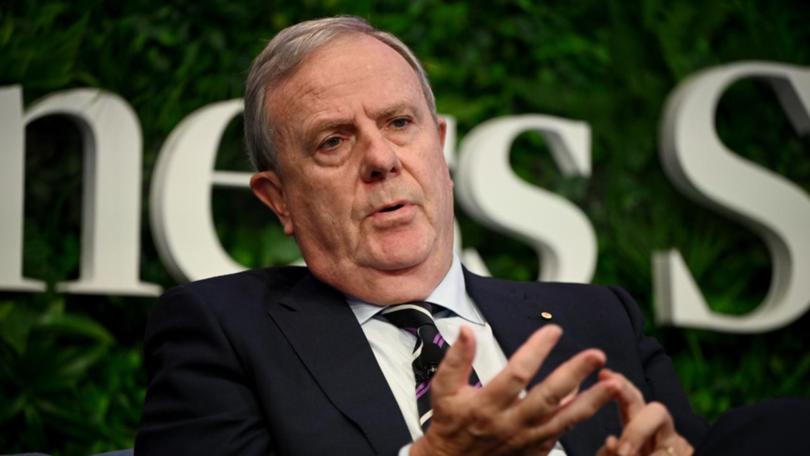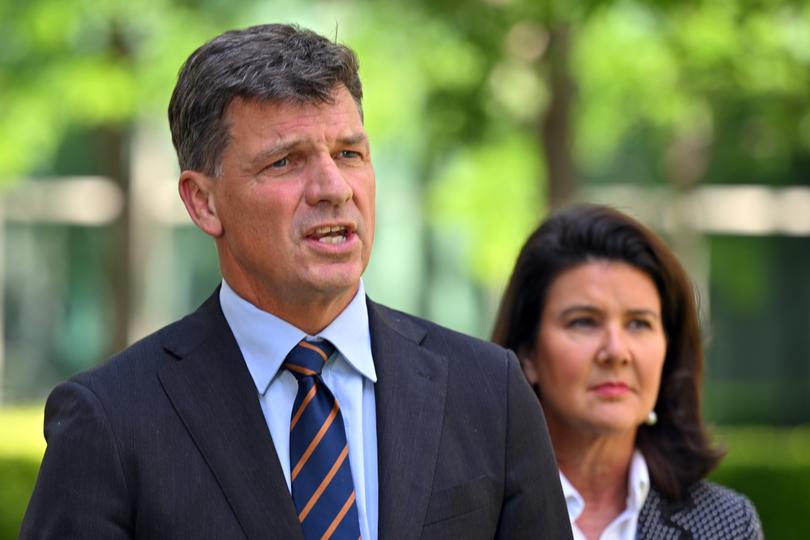Treasury Future Fund founder Peter Costello warns Labor’s overhaul risks creating a ‘political slush fund’
Peter Costello founded the $230 billion Future Fund that Labor is planning to overhaul, saying the changes risk creating a ‘political slush fund’ that would hurt taxpayers.

Treasurer Jim Chalmers on Thursday hit back at criticisms that a planned overhaul of the $230 billion Future Fund to prioritise housing, renewable energy projects and security infrastructure would undermine the body’s independence on investments.
The treasury’s decision to introduce the most consequential role change in the 18-year history of the sovereign wealth fund triggered a political bust-up with the Coalition, who accused the Federal Government of politicising the financial reserve for its own benefit.
Shadow treasurer Angus Taylor said Dr Chalmers was attempting to raid the nation’s nest egg to fund “pet projects”, as he promised the Opposition would overturn the investment mandate if elected next year.
Sign up to The Nightly's newsletters.
Get the first look at the digital newspaper, curated daily stories and breaking headlines delivered to your inbox.
By continuing you agree to our Terms and Privacy Policy.The move by the Albanese Government to direct the Future Fund towards investing in housing and the green energy transition where profitable led to a feisty exchange on the Senate floor with Minister for Finance Katy Gallagher trading political blows with her opposition counterpart Jane Hume.
“By politicising the Future Fund and its investment activities, Labor has opened up the door to putting any political agenda into the fund’s investment mandate,” charged Ms Hume.
“I strongly do not believe that this is politicisation of the Future Fund, what a load of rubbish! So something that was established two decades ago can never ever be changed under any circumstances? How ridiculous is that?” countered Ms Gallagher.
Earlier on Thursday, Dr Chalmers told Canberra-based reporters the proposal to modernise the fund to better serve national economic interests to the “ultimate benefit of the Australian people” was “not especially controversial.”
The independent sovereign wealth fund was created in 2006 by then-treasurer Peter Costello using budget surpluses to pay for public servants’ pensions, but to more broadly benefit future taxpayers.
The independently managed fund was set up with a $60.5 billion injection, which has since grown through investments to $230 billion, about one-tenth the size of the Australian economy.
The proposed change is one of the biggest shake-ups to its investment mandates since it began.
Dr Chalmers insisted that it was his job to improve an institution that was founded two decades ago and the maximising of its financial returns would remain the main goal. He accused critics of “partisan hyperventilating.”
The update would “mean more investment where we need it most, but without compromising the returns,” he said.
“I also want to be really clear that the government remains committed to the Future Fund, its independence and to its commercial focus,” Dr Chalmers added.
The fund will stick with its existing benchmark return rate of the consumer price index plus four to five per cent per annum over the long term.
The government also intends to give medium-term certainty by promising not to draw down on its holdings for at least seven years, until 2032-33.
“There are no changes being proposed here to the existing benchmark rate of return or the risk profile. The Government will not be directing specific investments being made by the fund,” stressed Dr Chalmers.
“The fund and its board will continue to make its decisions about investments independently. Its primary objective will be to continue to maximise returns,” he said.
“This is about ensuring that the fund will continue to provide strong returns to the government’s balance sheet, while also supporting some of those big national priorities.”
The Treasurer said he and Ms Gallagher had been working closely with the fund’s board of guardians, who welcomed the move as the basis for the institution to be “able to invest for the long term, and at the same time further strengthen the nation’s balance sheet”.
Future Fund chair Greg Combet said the government’s priority areas were aligned with the board’s thinking and “consistent with its investment focus on seeking more local currency exposure and protection against sustained higher inflation.”
The decision to defer withdrawals for at least seven years provided confidence to turn more focus and resources “to the areas of national priority identified in the new investment mandate that align with our risk and return hurdle,” he said in a statement.
The Future Fund oversees six other wealth funds, including a $22.3 billion medical research fund, a $4.4 billion disaster-ready fund and a $16.9 billion disability care fund.
It also oversees the $10 billion Housing Australia Future Fund, which was set up by the Labor government in 2023 to deal with housing supply.
However, Coalition shadow treasurer Angus Taylor outlined strong objections to the government’s plans, casting it as an opportunity for the government “to invest in whatever they think is necessary to deal with their economic failures.”

He added: “The Future Fund is Australians’ money, not the Treasurer’s money, not the Prime Minister’s money, it is Australia’s money.”
Fund founder Peter Costello rounded on the plan as a “very bad” idea that risked creating a “political slush fund” that would hurt the nation’s taxpayers.
“This is not a small ‘modernisation’. In fact, there is nothing ‘modern’ about this at all. This belongs to a very old tradition in politics: interfering with market investment for political purposes,” he said in a statement.
David Murray, the first ever Future Fund chairman, also raised serious concerns, telling the Australian Financial Review it could lead to the government using the sovereign wealth fund to finance off-budget spending.
“Investment returns will be more vulnerable, and everyone loses in this interventionist world,” Mr Murray said.
“The main concern is that the government no longer sees the Future Fund as independent, and its investments are an instrument of government policy.
“That means it can be used for boondoggle budgeting.”
Scott Hargreaves, executive director of the Institute of Public Affairs, told the Nightly the new policy undermined the fund’s founding objectives to meet unfunded superannuation liabilities, contribute to national savings and increase net worth.
“What Jim Chalmers is doing will trash each of these objectives and replace them with political objectives. Politicisation of investment decisions opens the door to corruption of the capital allocation process by lobbyists and rent-seekers,” he said.
Dr Chalmers new investment mandate is the first attempt by a Federal Government to specify asset classes for the fund to consider investing in, although tobacco investments were banned in 2013.
The Greens on Thursday urged the government to make a similar intervention to ban investment in fossil fuels.
“The government has a responsibility to direct investments away from coal, oil and gas and contribute to a clean, green and safe future for our children,” said Senator Barbara Pocock.

